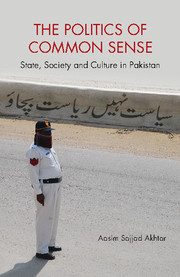Book contents
- Frontmatter
- Dedication
- Contents
- Preface
- Acknowledgments
- 1 Introduction
- 2 The Structure of Power ‘From Above’
- 3 Accumulation in Practice
- 4 The Many Faces of Islam
- 5 The Nation that Never Became
- 6 The Subordinate Classes: Beyond Common Sense?
- 7 Epilogue: What does a Counter-hegemonic Politics Look Like?
- Glossary
- Bibliography
- Index
2 - The Structure of Power ‘From Above’
Published online by Cambridge University Press: 05 July 2018
- Frontmatter
- Dedication
- Contents
- Preface
- Acknowledgments
- 1 Introduction
- 2 The Structure of Power ‘From Above’
- 3 Accumulation in Practice
- 4 The Many Faces of Islam
- 5 The Nation that Never Became
- 6 The Subordinate Classes: Beyond Common Sense?
- 7 Epilogue: What does a Counter-hegemonic Politics Look Like?
- Glossary
- Bibliography
- Index
Summary
Scholarship on the Pakistan state in particular and the structure of power ‘from above’ more generally has historically centred around a handful of themes, including, but not limited to, the dominance of military over civilian apparatuses; an ethnically skewed structure of power; state sovereignty in the face of consistent intervention by foreign powers; and the fortunes of landed and other propertied classes. At various points in the country's history, hypotheses about the very viability and continued existence of the state have also come to the fore.
In this chapter, I develop a historical-sociological sketch of the Pakistan state and the propertied classes, building upon the theoretical foundations laid out in the introductory chapter. My basic argument is that though the structure of power in Pakistan appears to remain centred around the ‘steel frame’ established by the British, substantial changes have taken place over the past few decades that demand fresh interrogation of the institutional dynamics of the state as well as its sociological composition. In similar vein, the mythical ‘feudal’ elite of the British era has been significantly affected by the process of social change, to the point that classical characterizations of Pakistan's political economy are now largely obsolete.
Put simply, the structure of power in Pakistan as it has evolved since the later 1970s is far more complex than most mainstream scholarship suggests. For all the change that has taken place, however, the story that I tell in this chapter is also about continuity. Despite its increasingly fragmentary character, the state remains the repository of power in society, both because state functionaries continue to mediate access to political and economic resources, and due to the (coercive, economic and discursive) control exercised by what is often called the ‘military establishment’. Even the propertied classes, therefore, perceive their interests to be served by proximity – and often deference – to an entrenched state apparatus.
As noted in the introductory chapter, the specific focus of this book is to explicate how Pakistan's patronage-based political order has undergone change, particularly since the late 1970s. It follows that there is a need to think much more deeply about how the structure of power operates ‘from below’ than most academic literature has traditionally done.
- Type
- Chapter
- Information
- The Politics of Common SenseState, Society and Culture in Pakistan, pp. 31 - 61Publisher: Cambridge University PressPrint publication year: 2017



